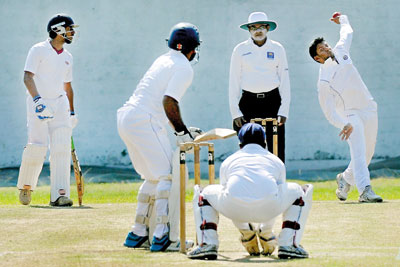Healing the festering Cricket wound
View(s):Where are we headed? How are we going to bridge the gap between the International call and the prevailing domestic structure? These are some of the perennial topics besetting local cricket for the past decade or more, and no one seems to be bothered.
Once, at a cricket presentation, it was revealed that, in general, in the local domestic season, a fast bowler is under-bowled. Sometimes the case was so bad that a national new ball exponent bowled only ninety overs for the entire first class season. As a result, the national fast bowler was woefully inadequate in match practice and fitness, when the talented young bowler had to represent his country in a Test match.
In general terms, a fast bowler bowls at least fifteen overs a day in a Test match and 25-30 overs in an inning. In the weight of that disparity, injuries were inevitable. For instance, young speed merchant Dushmantha Chameera did his full quota of service when the Lankans were in New Zealand, and was among the wickets but, he lasted only the first Test match in their next outing in England. After which Chameera was sent home with a stress fracture and he is still recuperating. Prior to that, Dhammika Prasad who was partly responsible for the Lankan win on English soil the last time around, was also injured, prior to the start of the Test series, and returned home early.
 Then, during the Australian tour, the Lankans exploited the home advantage and spun a web round the Kangaroo batting, making a mockery of their footwork. But, the Aussies worked on their follies and, by the time the T-20s came on, the Aussies made short work of the almost same Lankan attack that won an ICC World Championship two years ago, and even broke more than one existing Cricket record. This evidently shows that the Lankans do have a problem with their bowling arsenal. The local club format and the quality of cricket played were directly responsible for the situation, it is said.
Then, during the Australian tour, the Lankans exploited the home advantage and spun a web round the Kangaroo batting, making a mockery of their footwork. But, the Aussies worked on their follies and, by the time the T-20s came on, the Aussies made short work of the almost same Lankan attack that won an ICC World Championship two years ago, and even broke more than one existing Cricket record. This evidently shows that the Lankans do have a problem with their bowling arsenal. The local club format and the quality of cricket played were directly responsible for the situation, it is said.

Mathivanan stresses a point
Now it seems that, the people, who could help have understood the problem and are willing to seek redemption. In the five pillars of cricket at the SLC administration, the one headed by K. Mathivanan is responsible for the development of the domestic structure. According to him, they have recognised the problem and are willing to work towards a tangible solution.
Mathivanan explained, “The initial problem was to understand the gravity of the situation. I think we were partially successful in our endeavour during the last Super-Eight season, when we conducted the tournament at neutral venues, which produced high scoring games. This meant that, when played on neutral tracks, wickets were more conducive to batting, rather than the usual, out-and-out turners.”
The SLC tournament committee members put their heads together and compiled the future tournament structure. They opined that even the tournaments should be played to suit the upcoming challenges.

Mathivanan stresses a point
Mathivanan says, “if the four-day Provincial tournament is played, it has to include almost all the top players in the country. This is because, if they are away on national duty, the quality of the tournament is at stake, and this could paint a different picture.
“That is the main reason we have done away with the main four-day Provincial tournament in 2017. At the same time, we are going to utilise the Provincial one-day tournament and the T-20 tournament to identify talent for the ICC Champions Trophy to be played in June 2017.”
The next main SLC Cricket season will take place late next month with the advent of the Club tournament to be played in the customary 14 Premier and 10 Emerging teams on show. That tournament will culminate with the more focused Super-Eight tournament, which will be a three-day affair. This will be the vehicle to pick the players for the Provincial T-20 and the Limited-Overs tournaments.
The respective Provincial teams will have their own pool. But, according to Mathivanan, they are willing to stretch it a little further. This time, they intend using the Provincial system as a meaningful feeder to the national grid.
Mathivanan explained, “Besides the general squads that come under the Provincial system, they have brought in experienced spin bowling Coach Osahdee Weerasinghe and former champion seam exponent Chaminda Vaas to look after the next generation of local bowling talent. In this manner, even the talent training in bowling will not be limited to the national pool.”
At least on paper, the incoming domestic structure looks more purposeful than the one that meandered aimlessly and led to most of the problems in the top tier of International cricket. The general contingent of Board coaches will keep a close tab on the batsmen in the top tier in domestic cricket, while the two focused coaches will look into the needs of the domestic top tier bowling intake.
It is also pointed out that, though there was this initial fear of Club Cricket being sidelined, the present tournament has a balance of both Club and Provincial Cricket on show. Though Provincial Cricket has been played in Sri Lanka for quite a while, the real concept of ‘Provincial Cricket’ has not take root as yet.
Experts opine that to make Provincial Cricket a success, they would have to adopt a different strategy, where it would have to inculcate a different approach within. They say it has to be first established with the Junior grid, and then gradually worked upwards.
Unlike in other countries such as India, Australia and England, where a province-based top tier was established at the initial stages, it was club Cricket, mainly around the metropolis, that took root in Sri Lanka. Now, it would be difficult to change the very root of Lankan Cricket.


